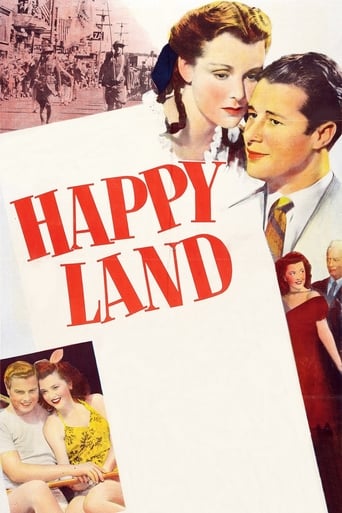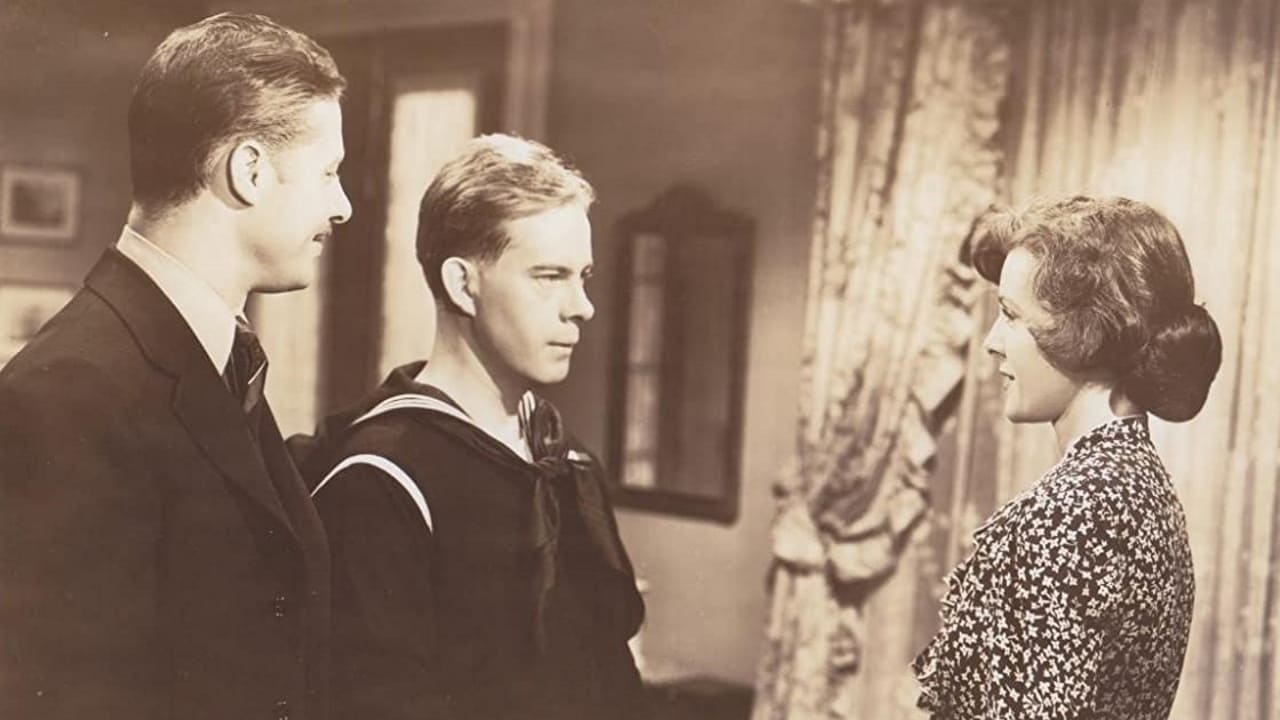Alonzo Church
Don Ameche's son is killed in WW II. Can grandpa Harry Carey, returning from the dead, convince a grieving Ameche that his life, his son's life, and this whole war is worth his son's sacrifice, and get Ameche to believe his small town is indeed HAPPY LAND?Despite a wonderful opening sequence, reminiscent of the homespun melancholy of the better parts of Our Town and Since You Went Away, this is a rather superficial and bland treatment of the grief of a good, if temporarily embittered man, whose son has died in the war. Ameche, a decent enough actor, does not have skill to bring off his role, and Harry Carey, with his mono-tonal voice, and facial expressions running the gamut of emotions from A to B, makes conversations about life and death as enchanting as a conversation about whether to pick up milk at the store. The result might be truly Midwestern in its emotions, but it's questionable whether that's a good thing.Much of the movie is flashbacks to the life of Ameche's child (though, interestingly, we do not see the kid actually fighting in the war). There's nothing especially interesting in the flashbacks, nor, really, is there much there that would provide comfort to Ameche. A final scene, where Ameche learns from a young Harry Morgan how his son died heroically, works somewhat better, simply because Morgan's flat Midwestern delivery and Ameche's flat Midwestern delivery grounds what has been rather leaden supernatural stuff in a bit of reality. Whether Ameche, under these circumstances, would find the will to go on again after all this, is questionable.A comparison between this film and It's A Wonderful Life is inevitable, as they deal with the same basic situation. This film, far more low key and far less extreme than the Stuart/Capra collaboration, might be more appealing to folks who prefer their fantastic/supernatural cinema to be realistic. But to this viewer, the far more dramatic events and emotional acting of Stuart makes his movie more fun to watch and, oddly enough, more believable.Assessment -- Don't avoid this movie. You might like it. Alas, I did not.
RJC-4
Finding this oddity on cable recently, I was quickly seduced by its opening sequence, a Welles-like plunge down main street into a small everytown's heart, Marsh's pharmacy. Here, as some clever camera work reveals, solid citizen Lew Marsh (Don Ameche) tends to the blisses of early 40's Hollywood America; everyone's prescription is filled, sundaes topped off with a cherry, local oddballs humored, etc.What most recommends the film is its frame narrative. Quickly the idyll is broken when Marsh learns his son has been killed in the war. He sinks into a lengthy depression. Enter the ghost of Gramp to conduct psychotherapy: he spirits Marsh back into the past where we relive the childhood, adolescence, and early adulthood of the now-dead Rusty. While the mid-section unfolds linearly, Marsh and Gramp function offscreen as a Greek chorus (their melancholy dialogue often a grim counterpoint to the generally cheerful scenes). Then it's back to the present where an exorcized Marsh learns to stop questioning the wisdom of sacrificing young men in war. "Rusty died a good death," Gramp's ghost counsels, and we know it's only a matter of time before Marsh will agree.Three years before "It's A Wonderful Life" (1946), "Happy Land" was already hijacking the "Christmas Carol" device of reliving the past on a therapeutic sightseeing tour. Unlike the Stewart film, though, the tone is more darkly somber, lingeringly mournful. The theme of sorrow outweighs the theme of recovery. Ameche looks and sounds wracked, bitter.In fact, the film's heart is scarcely in its chief enterprise, which is to steel its audience for more wartime sacrifice. It seems at times almost to be working against its own message that war deaths are "good deaths." I imagine it may have helped salve some broken hearts, but the crime of this type of film is that, if it succeeds, it only helps to break more.
nstobert
I thought this was a wonderfully nostalgic movie. The acting is well done, and the end is just a real tear-jerker. It brings back the feelings that I believe really did exist in WWII, right down to the fateful trip the girl from Western Union had to make to deliver the telegram that said his son died. Excitement, no. A few laughs, yes. Great nostelgic drama with a good story line.
Wayne119
Saw this movie with my family in 1943 at age 10. We all liked it, even though it made us sad. Seems like it starts with Rusty already dead, killed in the war. Then there are flashbacks to his childhood. What it said to me back then was: war makes no sense. I'm not sure that's what was intended.


 AD
AD


